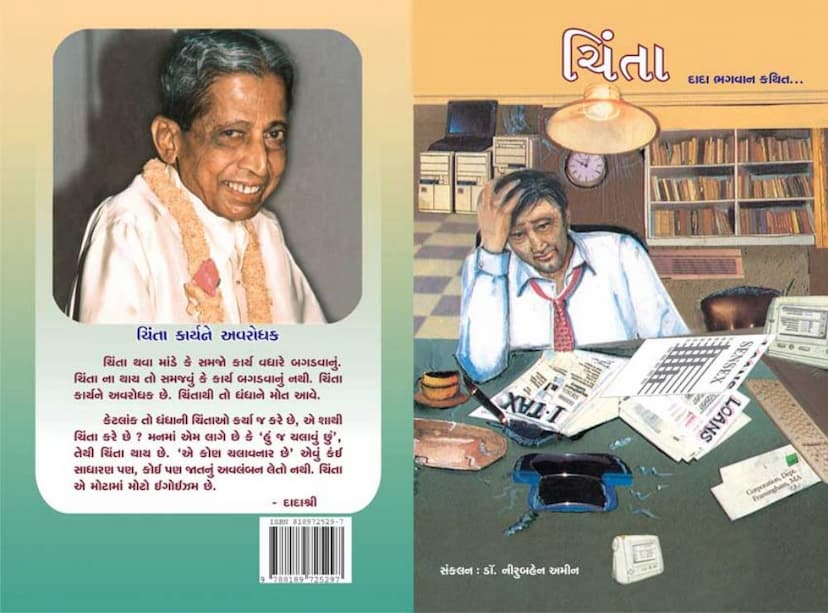Chinta
Added to library: September 1, 2025

Summary
This Jain text, titled "Chinta" (Worry/Anxiety) by Dada Bhagwan, published by Mahavideh Foundation, is a discourse on the nature and eradication of worry. The central message, conveyed through Dada Bhagwan's teachings, is that worry is a major obstacle to progress and a manifestation of ego.
Here's a comprehensive summary of the key points from the provided pages:
The Nature and Impact of Worry (Chinta):
- Obstacle to Action: Worry hinders work and leads to its deterioration. If you don't worry, it signifies that the task is not going to be spoiled.
- Cause: Ego and the Illusion of Control: Worry arises from the ego's belief that "I am the one running this." It stems from not understanding the scientific laws that govern the world and mistakenly taking on the role of the doer.
- Detrimental Effects:
- Causes business to "die."
- Leads to suffering and burning, preventing sleep, appetite, and inviting diseases.
- Can even lead to rebirth in animal realms.
- Wastes potential and is a significant loss of energy and time.
- Attracts misfortune, such as financial loss.
- It's described as "pragatl agni" (manifest fire) that constantly burns.
- Worry vs. Thought: Worry begins when thoughts become a whirlpool, escalating into a chaotic state. It's essential to stop thoughts when they start to spiral.
- Egoism and Doer-ship: Worry is the greatest form of egoism. The belief that "I am the doer" is the root cause. Without understanding who the actual doer is, one takes on the burden of responsibility.
The Root Cause and Solution:
- The Illusion of "I am the Doer": The fundamental reason for worry is not understanding who the true "Kartā" (doer) is. The world is run by scientific circumstances, not by an independent doer. Everyone is merely an instrument.
- Release from Worry through Self-Knowledge: Worry can be permanently eradicated only when the belief of being the doer is relinquished. This happens through gaining Self-Knowledge ("Ātmajnāna").
- The Role of the Gnani Purush (Knower of the Self): The text emphasizes that a Gnani Purush can help one attain Self-Knowledge, which in turn removes the belief of being the doer and thus eliminates worry.
- Trust in God/Higher Power: Worry stems from a lack of faith in God. Trusting that God (or the universal order) will manage things is crucial.
- The "Vyasthit" Principle: Understanding the scientific law of "Vyasthit" (that everything happens due to scientific circumstantial evidence) is presented as a way to dissolve worry. When something goes wrong, accepting it as "Vyasthit" (correct as it happened) releases one from the burden of worry.
- Acceptance of Present Reality: One should enjoy what is received in the present ("prāptane bhogvo") and not worry about the unattainable ("aprāptani chintā nā karo").
- Living in the Present Moment: Dwelling on the past or worrying about the future is unproductive. Focusing on the present moment ("vartamān") is the way to avoid worry.
Dada Bhagwan's Philosophy and Approach:
- "Akram Marg" (The Path of the Effortless Way): Dada Bhagwan's teachings offer an "Akram Marg," a direct and swift path to Self-realization, akin to an elevator rather than climbing stairs.
- Experiential Knowledge: The text highlights that merely hearing about not worrying is insufficient; the experience of freedom from worry is what matters.
- The "Dada Bhagwan" within: Dada Bhagwan explains that "Dada Bhagwan" is the pure soul residing within everyone, which becomes fully manifest in the Gnani Purush. He himself bows to the Dada Bhagwan within him.
- Living Principles: Dada Bhagwan lived by the principle, "Religion is diminished in business, but business is not diminished in religion." He never took money from anyone and used his business earnings to sponsor pilgrimages.
- The Role of Satsang: Satsang (spiritual discourse) is presented as a means to overcome worry. If a satsang doesn't help eliminate worry, one should find a different one. True peace should be permanent, not fleeting.
- Surrendering to the Doer: The core of the solution lies in recognizing that one is not the doer. When faced with difficulties, surrendering the belief of being in control to a higher power or the "Vyasthit" order is key.
Distinguishing Worry from Care and Worrying about the Future:
- Care vs. Worry: Care ("kāljī") is defined as awareness, while worry ("chintā") is described as burning the soul.
- Future Worries: Worrying about future events like a daughter's marriage is a manifestation of ego and unnecessary. All provisions are brought by the soul at birth.
Key Quotes and Metaphors:
- "Worry is the greatest egoism."
- "Worry is like manifest fire, it constantly burns."
- "If you don't worry, the task will not be spoiled. If you worry, the task will be further spoiled."
- " Worry is the cause of business 'death'."
- The metaphor of being a guest of nature, who should be content with what is provided, is used to illustrate that worry is inappropriate.
- The analogy of a "shutters" or "doors" that allow worry to enter, like comparing the "chinta" to the "pragat agni" (manifest fire).
In essence, "Chinta" by Dada Bhagwan guides the reader to understand that worry is a self-created mental affliction rooted in ego and the illusion of being the doer. The ultimate solution lies in attaining Self-Knowledge, trusting in the divine order, and living in the present moment, thereby achieving a state of worry-free existence.